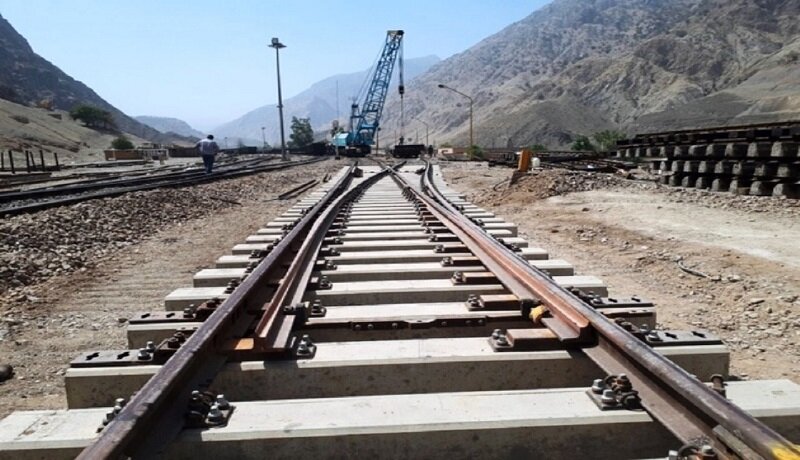Iran-Russia railway deal could be game-changer for global transit

TEHRAN – Iran and Russia, both under harsh Western sanctions, on May 17 inked an agreement on the long-stalled construction of a railway connecting the northern Iranian cities of Rasht and Astara.
The railway is key to the International North-South Transit Corridor (INSTC).
Spanning 162 km (100.6 miles), the railway is a crucial element of the INSTC. The corridor integrates road, rail, and sea transportation, facilitating the movement of goods between Russia and India via Iran.
Through a video link, Iranian President Ebrahim Raisi and his Russian counterpart Vladimir Putin addressed the ceremony in Tehran where the two countries' transport ministers signed the agreement.
Raisi thanked Putin and the Russian government for their involvement in the initiative and referred to it as an "important strategic step" in bilateral cooperation that will benefit all countries involved in the INSTC. Putin, for his part, called the occasion a "landmark moment for the entire global transport infrastructure."
The deal came a day after Iran's Trade Promotion Organization chief Alireza Payman-Pak announced that Russia's second-biggest bank, VTB, had opened a representative office in Tehran.
Peyman-Pak said that the office, which marks the first "direct presence" of a Russian bank in Iran, will be used for foreign currency transfers.
State-owned VTB was sanctioned by the EU, UK, and the US following the conflict between Russia and Ukraine in Feb. 2022.
The railway deal has been hailed by state officials and media in Iran as part of a significant future source of income.
Raisi's Deputy Chief of Staff for Political Affairs Mohammad Jamshidi has predicted that the earnings from the INTSC would be able to rival Iran’s oil revenue. In this vein, the ISNA news agency on May 17 estimated annual revenue of $20 billion from the Corridor.
The Jam-e Jam newspaper described Iran as the "golden path of trade" in an article highlighting the potential benefits of the railway.
Meanwhile, the Tasnim News Agency said ahead of the deal that the "curse" that has so far stalled the railway project would be broken through "Russian partnership."
India, Iran, and Russia initially struck an accord in 2002 to forge the INSTC. The ambitious undertaking aims to create a new transit route linking India to Afghanistan, Central Asia, and Russia via Iran's southern and northern coastal regions.
The corridor is seen by Russia as a potential rival to the Suez Canal, a far longer route for trade with northern Europe.
Iran has been a key player in the INSTC and stands to benefit greatly from its full realization. As reported by Amwaj.media, the Raisi government has seemingly banked significantly on transit becoming a top revenue generator. But Iran stands to gain from the project in more ways.
The operationalization of the corridor could mean improved relations between Iran and India, aligning New Delhi more closely with Tehran’s regional interests.
A vital element of the INSTC, the Rasht-Astara railway project has been stalled for years due to costs, engineering, and logistical complications.
Leader of the Islamic Revolution Ayatollah Ali Khamenei stressed the importance of completing the stretch of railway in his July 2022 meeting with Putin in Tehran.
VTB's new office in Tehran is part of Iran and Russia's ongoing efforts to connect their banking systems.
The two countries signed an agreement on Jan. 29 to link their inter-bank messaging systems.
Due to Western sanctions, both countries have been cut off from SWIFT—a leading Belgium-based financial messaging service.
Both Iran and Russia are looking to reap the potential economic benefits of increased transit amid Western sanctions.
The Raisi government seeks to mitigate the adverse effects of sanctions through de-dollarization of trade and the establishment of direct banking and payment channels outside the international banking system.
Dr. Bijan Khajehpour, managing partner of the Vienna-based Eurasian Nexus Partners, told Amwaj.media that if the legal structures are put in place, it could take only a few months for VTB’s new office to process transactions. However, Khajehpour cautioned that “usually, it is the lawyers who delay such processes,” adding that “to complete the picture” it is also necessary to consider that VTB is subject to Western sanctions and that its operations in Iran “will have to rely on the agreements and structures between Moscow and Tehran, such as a non-SWIFT messaging system.”
On the political side, a successful increase in transit revenues will reinforce Iran's "Look to the East" policy of strengthening ties with neighboring countries and eastern powers as a response to western pressure. This could encourage Raisi's hardline supporters, who have touted Iran's place in an emerging multipolar "new world order."
Russia has failed to hide its angry of the rising ties between Iran and Russia. The U.S. State Department deputy spokesperson has expressed alarm about the Rashst-Astara railway deal. At a news conference on May 17, Vedant Patel stated, “We of course would find deeply concerning any steps or any project being undertaken to go around sanctions.”
In response Iranian Foreign Ministry spokesman Nasser Kanaani said the Joe Biden administration’s concerns about Tehran’s expansion of trade cooperation with other nations is “unjustified and invalid”.
Kanaani said the most recent agreement with Russia is in line with Iran’s emphasis on the policy of good neighborliness.
He stressed that the cornerstone of closer ties with neighbors is “cooperation for common security, development, and welfare.”
Leave a Comment